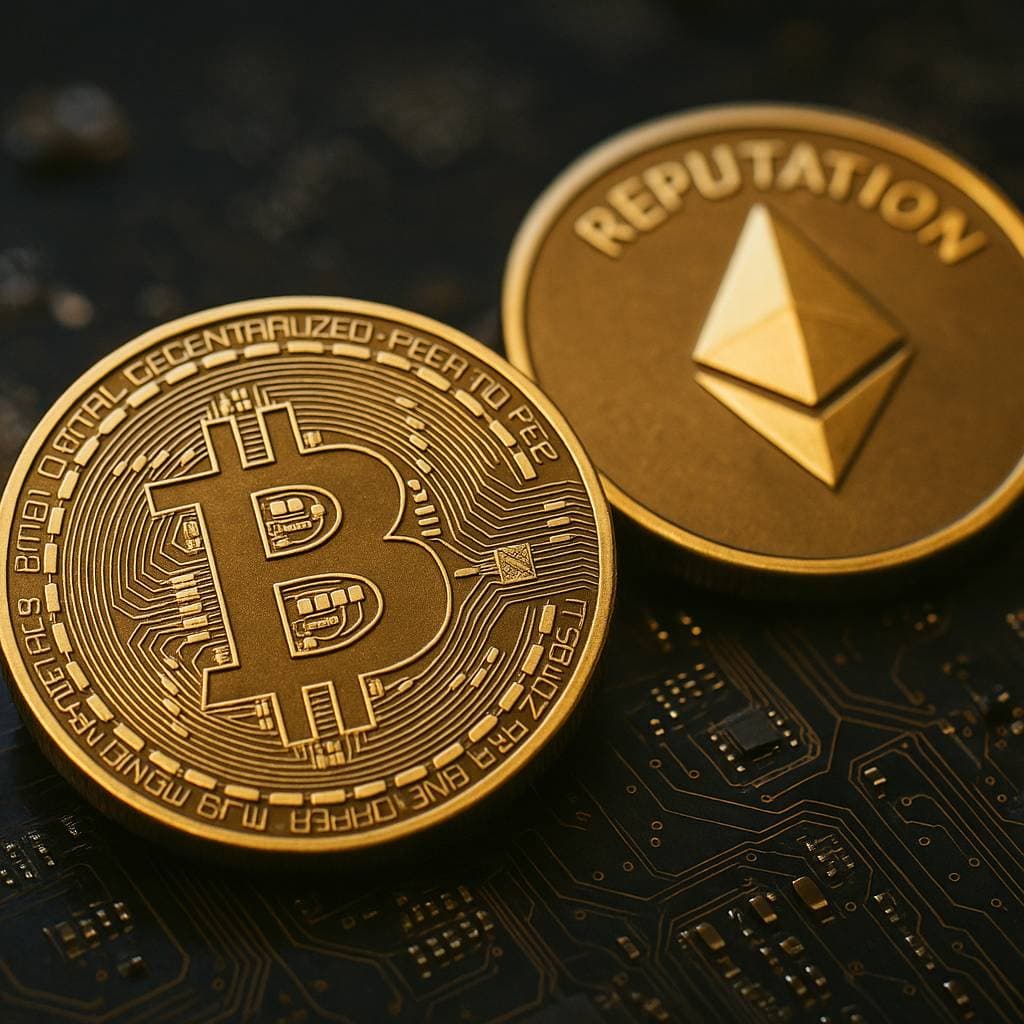From Identity to Reputation
For much of blockchain’s history, identity has been the missing link. Users could prove ownership of funds, but not trustworthiness.
Anonymous addresses fueled innovation—but also made reputation impossible.
The first major wave to address this problem came through self-sovereign identity (SSI) frameworks, which allowed users to prove who they were without relying on centralized databases. Initiatives like Proof of Humanity, Polygon ID, Worldcoin, and BrightID all aimed to authenticate uniqueness while protecting privacy.
But now, the conversation is shifting. In Web3’s next evolution, the question is no longer who you are—it’s how you act.
Enter on-chain reputation tokens: verifiable records of a user’s behavior, reliability, and participation encoded directly on blockchain networks.
These tokens aren’t about revealing identity; they’re about earning credibility. They capture a user’s on-chain footprint—their votes in decentralized autonomous organizations (DAOs), loan repayments in DeFi, and contributions to open-source communities—and transform it into measurable trust.
Trust Is Becoming the New Currency
In traditional finance, a person’s ability to borrow, invest, or manage assets depends on credit history and institutional trust. In DeFi, by contrast, trust has always been replaced with collateral. You can’t borrow unless you overpay with tokens—often two or three times the value of your loan.
Reputation tokens aim to rewrite this rule. Instead of locking up excess funds, a user could unlock access to credit, governance, or rewards through a reputation score derived from provable blockchain behavior.
Imagine two DeFi users:
- One consistently repays loans and votes in DAO proposals.
- The other frequently engages in speculative farming and exits early.
Under a reputation-based model, the first user would naturally qualify for better lending terms or access to advanced governance rights. Reputation becomes a kind of soft collateral—a signal of reliability rather than raw wealth.
This idea has profound implications. It could enable under-collateralized lending—something traditional banks do every day but decentralized systems still struggle to replicate. It could also transform DAO governance from token-weighted plutocracies into merit-based democracies, where influence scales with contribution, not holdings.
Find curent market prices, news and ai information here
The Mechanics of Reputation Tokens
Reputation tokens function through attestations—cryptographic proofs issued by trusted entities or smart contracts that confirm specific user actions.
For example:
- A DAO may issue an attestation confirming a user voted in 90% of proposals.
- A DeFi protocol could attest that a wallet repaid every loan on time.
- A contributor platform might verify the completion of a community task or code submission.
These attestations can be stored, aggregated, and converted into weighted scores. Over time, they form a “reputation graph,” reflecting not just activity, but reliability.
Early frameworks like the Ethereum Attestation Service (EAS), Galxe, and Lens Protocol are experimenting with standardized reputation architectures. They allow users to collect proofs from multiple sources and carry them between ecosystems.
The concept aligns closely with W3C Verifiable Credentials—a global standard for digital proofs. In both models, the data remains under user control. Credentials are issued, stored in a user’s wallet, and presented selectively. The blockchain verifies their authenticity, not their content.
This approach keeps personal data off-chain but preserves transparency and interoperability—making reputation both portable and private.
A DeFi Primitive in the Making
Reputation tokens could represent DeFi’s next major primitive—joining stablecoins, liquidity pools, and governance tokens as fundamental building blocks.
Their introduction would enable new financial models:
- Dynamic lending rates based on user trust.
- Reputation-weighted insurance where premiums reflect past behavior.
- DAO voting systems where experience or reliability boosts influence.
- Cross-protocol access where reputation earned in one ecosystem unlocks privileges in another.
This evolution mirrors traditional finance’s journey from anonymous cash transactions to trust-based credit systems. Yet in Web3, the process is transparent, auditable, and programmable.
For developers, it’s a breakthrough. Reputation tokens can be integrated into smart contracts as automated filters—approving or rejecting actions based on trust scores. That could remove human bias while keeping decision-making decentralized.
The Challenges of Quantifying Trust
Still, turning behavior into a tradable signal isn’t easy.
Trust is complex, subjective, and context-dependent. Reputation systems risk oversimplifying it into a single number—much like credit scores, which often fail to capture nuance or second chances.
Blockchain developers must solve several design challenges:
- Sybil resistance: Preventing users from creating multiple wallets to farm positive reputation.
- Reputation decay: Determining how older actions lose weight over time.
- Bias and manipulation: Avoiding reputation monopolies or ideological skew in attestation sources.
- Privacy: Balancing accountability with anonymity—ensuring users aren’t forced to expose personal information to earn trust.
If these systems become too rigid or opaque, they could recreate the same gatekeeping that decentralized technology was meant to escape.
Some teams are exploring reputation oracles—neutral entities that aggregate multiple sources and normalize scores transparently. Others propose decentralized arbitration: if someone disputes a negative attestation, a DAO or community vote could review it.
Like early DeFi experiments, reputation tokens will likely evolve through trial and error—tested first in small communities before scaling globally.
When Reputation Meets Regulation
Another inevitable frontier is regulation.
If reputation scores begin to influence lending or investment access, they could fall under financial rules similar to those governing credit scoring. Regulators might demand auditability, explainability, and non-discrimination guarantees.
That could be both a risk and an opportunity.
Properly designed, decentralized reputation systems could offer regulators exactly what they’ve long wanted—transparent, auditable trust frameworks that operate without opaque intermediaries.
Instead of fearing surveillance, blockchain could show regulators that transparency and privacy can coexist.
The same cryptographic proofs that make reputation tokens work could also provide compliance assurances without compromising user sovereignty.
Speculative Scenario: AI, Reputation, and the Future of Digital Credit
Looking ahead, the intersection of AI and on-chain reputation could define the next era of financial technology.
AI models trained on blockchain data could analyze behavioral patterns across millions of wallets—predicting creditworthiness, flagging risky trading behaviors, or even optimizing DAO voting outcomes. Combined with reputation tokens, this would create self-improving trust systems where machine learning continually refines reputation signals.
A more ambitious scenario links reputation to central bank digital currencies (CBDCs).
Imagine CBDC networks recognizing verifiable Web3 reputation credentials for credit assessment or digital identity verification. A user’s blockchain-based trust score could one day influence access to regulated digital finance, merging decentralized and institutional trust systems.
While this remains speculative, the momentum is real. The fusion of AI, reputation, and blockchain is not about replacing human judgment—it’s about enhancing fairness, speed, and transparency in an increasingly automated economy.
Why It Matters
Reputation tokens may quietly redefine what digital ownership means.
Crypto began by digitizing value; now it is digitizing credibility.
For decentralized ecosystems to scale, trust must evolve beyond code.
The idea that your actions—not your assets—can unlock opportunity is powerful. It flips the Web3 narrative from speculation to merit.
If adopted widely, reputation tokens could build a financial internet where good behavior compounds like interest—a system that rewards integrity as much as innovation.
The technology is still early, the standards unfinished, but the direction is unmistakable.
Reputation is no longer abstract—it’s programmable.
The Next Layer of Trust
- Reputation tokens turn on-chain behavior into verifiable credibility.
- They enable lending, governance, and access based on merit, not wealth.
- Core challenges include bias, Sybil resistance, and score transparency.
- Developers are testing decentralized attestation and arbitration models.
- The convergence of AI, identity, and reputation could define Web3’s future.

